


"We are not backing down from Model B which would offer shares in the value of the motorways to citizens, directly or indirectly through pension funds. The only problem is that this model will bring in less money to pay off the debts compared to the model we are abandoning because of the threat of a referendum," Grcic told reporters during the "3 Economist EU-Southeast Europe Summit", organised by the British financial magazine, The Economist, the Croatian foreign ministry and the Croatian Chamber of Commerce.
The government was backing out of offering the motorways up for concession because, as he said, the threats of a referendum. He underscored that in the financial sense that model would have been a vital injection to reduce the overall public debt by about three billion euro.
"Citizens showed their disagreement with their signatures. That project was good and enabled the repayment of part of the public debt, on the other hand, we need to respect the will of the people," said Grcic.
The Jutarnji List daily on Friday reported that the Ministry of Maritime Affairs, Transportation and Infrastructure had informed the two consortia that had submitted non-binding bids for the motorway lease, that the government was withdrawing from the lease and intended to sell the HAC-ONC motorway maintenance and toll company through a public offer.
As far as capital investments are concerned, Grcic said that the government had prepared several and that most of these would be financed from EU funds.
Asked to comment on the alleged obstruction by Deutsche Telekom with regard to the government's broadband Internet project, Grcic said that the government was protecting the interest of Croatian citizens and added that he was in favour of enabling every village, town and citizen to be connected to the web.
(Hina) sp